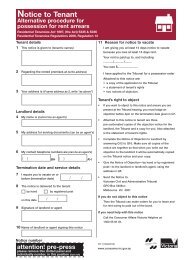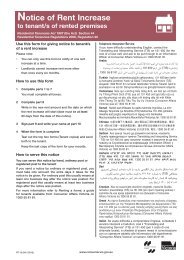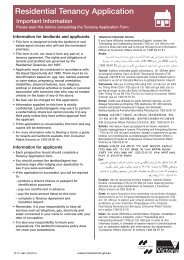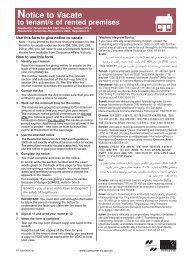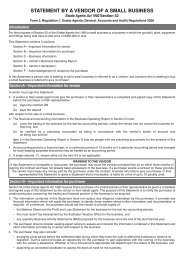Renting a home: a guide for tenants - Consumer Affairs Victoria
Renting a home: a guide for tenants - Consumer Affairs Victoria
Renting a home: a guide for tenants - Consumer Affairs Victoria
You also want an ePaper? Increase the reach of your titles
YUMPU automatically turns print PDFs into web optimized ePapers that Google loves.
Tenancy databases<br />
Tenancy databases, also referred to as<br />
‘blacklists’ or ‘bad tenant databases’,<br />
contain in<strong>for</strong>mation about the renting<br />
history of certain <strong>tenants</strong>.<br />
A landlord or agent can pay a<br />
membership fee to access a database<br />
when choosing a tenant <strong>for</strong> a property.<br />
They can use the database to:<br />
• search <strong>for</strong> and screen prospective<br />
<strong>tenants</strong><br />
• list previous <strong>tenants</strong>.<br />
Notifying prospective <strong>tenants</strong><br />
about databases<br />
When you apply to rent a property,<br />
the landlord or agent must:<br />
• advise you if they subscribe<br />
to a database<br />
• provide you with the contact details of<br />
the database operator.<br />
The details must be in writing and should<br />
be included with the ‘Residential Tenancy<br />
Agreement’ <strong>for</strong>m.<br />
If the landlord or agent finds details of<br />
you on a database, they must advise you<br />
in writing, within seven days, of:<br />
• the name of the database and the<br />
person who listed the in<strong>for</strong>mation<br />
• the in<strong>for</strong>mation held in the database<br />
• how you can check, change or remove<br />
the listing (i.e. by contacting the<br />
database operator or the person who<br />
listed you).<br />
The landlord or agent can face<br />
significant penalties <strong>for</strong> not advising<br />
you about databases.<br />
PART 1: Beginning a tenancy<br />
Listing a tenant on a database<br />
You can only be listed on a database if:<br />
• you were named on the tenancy<br />
agreement<br />
• the agreement has ended<br />
• you breached the agreement and<br />
because of the breach, you owe an<br />
amount more than the bond, or VCAT<br />
has made a possession order.<br />
This applies if you breached your tenancy<br />
agreement by:<br />
• maliciously damaging property<br />
• endangering neighbours’ safety<br />
• not paying rent<br />
• failing to comply with a VCAT order<br />
• using the property <strong>for</strong> illegal purposes<br />
• sub-letting the property without the<br />
landlord or agent’s consent.<br />
Be<strong>for</strong>e listing a tenant on a database,<br />
the landlord or agent (or the database<br />
operator) must notify the tenant in<br />
writing, and provide them with 14 days<br />
to object.<br />
Updating or removing listings<br />
Listings more than three years old must<br />
be removed from a database.<br />
If the landlord or agent become aware<br />
that in<strong>for</strong>mation listed is inaccurate<br />
or out-of-date, they must notify the<br />
database operator within seven days.<br />
The operator must then change or<br />
remove the listing within 14 days.<br />
You can apply to VCAT to change or<br />
remove inaccurate or out-of-date listings.<br />
9



